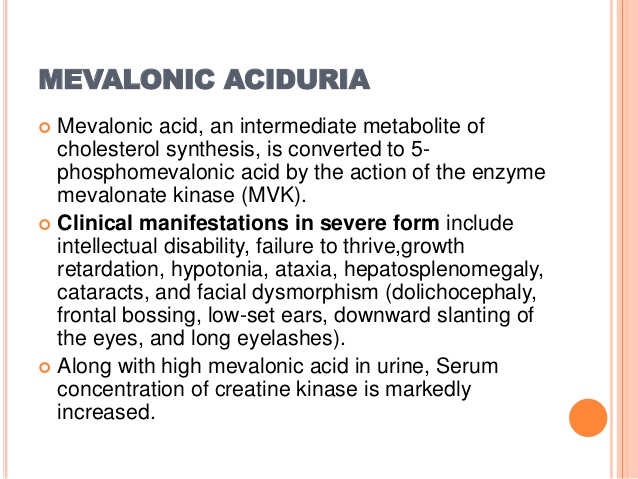| NPU27072 | Mevalonat / Kreatinin;U (× 10-3) | Betegnelse i SP |
| UMEVALON | U—Mevalonat / Kreatinin (× 10-3) | Betegnelse i Labka |
| | U—Mevalonsyre (× 10-3) | Betegnelse i laboratoriet |
|
 |  |
| Rekvirering | Labka/rekvisitionsseddel |
| Web-adresse til rekvisitionsseddel | Link til rekvisitionsseddel |
| Kode (SP) | NPU27072 |
| Analyse/undersøgelsesnavn - SP | Mevalonat / Kreatinin;U |
| Indikation | Mistanke om Hyper IgD Syndrom (HIDS, mevalonatkinase mangel) |
| Oplysninger ved rekvirering | Kliniske oplysninger bedes oplyst i forbindelse med rekvirering |
| Prøvemateriale | Urin |
| Volumen/mængde | 10 ml (min. 5 ml) |
| Prøvebeholder inkl. additiver | Spids PS (Klart plastspidsglas, usterilt med skruelåg) |
| Mærkning af (primær) prøvebeholder | Patientens CPR-nr. og navn |
| Prøvetagning, herunder særlige forhold | Skal opsamles under feber |
| Opbevaring, holdbarhed og forsendelse | Spidsglasset fryses straks ved -20 °C.
Alm. postforsendelse: Mandag – onsdag i frossen tilstand efter gældende transportregler på tøris. Må ikke afsendes dagen før en helligdag.
Opbevares ved -20 °C indtil forsendelse. |
| Svartid | 1 måned (evt. længere ved samtidig rekvirering af andre analyser) |
| Svarafgivelse | Pr. brev |
| Ekstern Pris (kr.) | 2.293 |
| Kontaktmuligheder | Prøvemodtagelsen: 3545 4061, https://www.rigshospitalet.dk/metlab |
| Afleveringssted og afleveringstidspunkt | Metabolisk Laboratorium 4061
Klinisk Genetisk Klinik
Rigshospitalet
Blegdamsvej 9
2100 København Ø
Mandag-torsdag: 8.00-15.00, fredag: 8.00-12.00 |
| Gyldig fra | 07/01/2015 |
| Akkrediteret | Nej |
| Indtastet/gennemset af | 23/05/2016 Initialer : ERN |
Fróðleikur:
The periodic fever syndromes encompass a group of autoinflammatory disorders characterized by recurrent fevers and inflammation in the absence of infectious triggers. Mevalonate kinase deficiency is an autosomal recessive form of periodic fever syndrome.
The clinical spectrum of mevalonate kinase deficiency is broad, ranging from mild (Hyper IgD syndrome) to severe (mevalonic aciduria). These two diseases were initially described as two separate entities, but it is now clear that the underlying molecular cause is the same. In HIDS the mevalonate kinase activity is 1-10% while in MVA the kinase activity is completely absent.
Hyper IgD Syndrome (HIDS) This disease is characterized by the onset of episodic fevers before the first year of life lasting 3-7 days and recurring every 2-8 weeks. Attacks of fever are associated with skin rash, cervical lymphadenopathy, diarrhea, arthritis/arthralgia, oral ulcerations, abdominal pain, and hepatosplenomegaly. Attacks can be provoked by vaccinations, stress, and viral infections. Serum IgD are elevated (>100 IU/ml) in the majority of patients during and between attacks (20% of patients can have normal IgD levels). IgA levels are also increased in 80% of patients.
Mevalonic Aciduria (MVA) Patients with mevalonic aciduria are characterized by recurrent febrile episodes similar to hyper IgD syndrome. However, patients also exhibit dysmorphic facial features (microcephaly, low-set posteriorly rotated ears, down slanted palpebral fissures), ataxia, mental retardation, cataracts, and failure to thrive. Patients have greatly elevated mevalonic acid levels in the urine during and between attacks.
The overall prognosis for HIDS is quite good with a relatively benign clinical course. Amyloidosis can be a serious complication, but it has been reported in only 3% of HIDS patients. However, patients with severe early onset MVA can have significant premature mortality during infancy or early childhood. |
 |